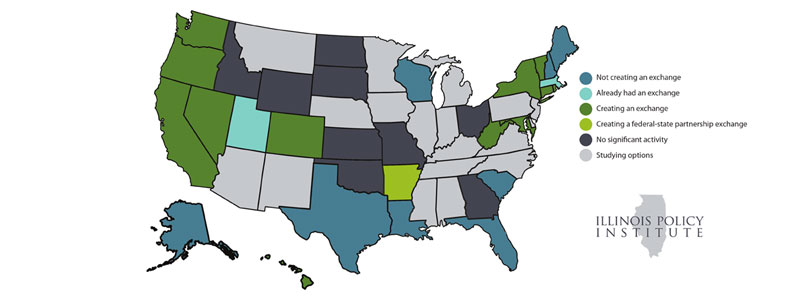Republicans Send out Mixed Messages on Health Care Exchanges
In sharp contrast to Gov. Lincoln Chafee in Rhode Island, some Republican governors have decided against setting up the health insurance exchange system included as part of the federal health care law.
Govs. Rick Scott (R-FL), Scott Parnell (R-AK), Susana Martinez (R-NM), Rick Perry (R-TX), Bob McDonnell (R-VA), Chris Christie (R-NJ), Nikki Haley (R-SC), and Bobby Jindal (R-LA) have all indicated that they will resist setting up the exchange system.
This approach is in line with the recommendations of the Rhode Island Center for Freedom and Prosperity and other free market organizations, which view the exchange systems as costly, inefficient, and heavily bureaucratic. However, there are leading figures within the Republican Party who have been critical of their own governors for resisting implementation. There is ample room to create health insurance exchanges that incorporate free market values and allow for greater consumer choice, they argue.
Under the Patient Protection and Affordable Care Act (PPACA), states can apply for “Innovation Waivers” that would allow them to opt out of the exchange system; at least over the short term. The U.S. Supreme Court ruling also makes it possible for states to decline any expansion of their Medicaid rolls without losing federal funding.
Rhode Island lawmakers can either proceed forward with Gov. Chafee’s executive order creating the ObamaCare exchange, or they can pursue state-level alternatives that are less dependent on federal legislation that may yet be repealed.
“In addition to the uncertainty around PPACA, there is a substantial likelihood that the exchanges will not work as intended or provide real benefits to Rhode Island’s citizens,” the Center warns in a recent policy brief. “Embracing exchanges is likely to result in reduced consumer choice, reduced competition, higher premiums, suppressed innovation in health plan design, loss of state sovereignty, and substantial uncertainty as PPACA faces legal, political, and public challenges.”
But as Democratic operatives have been quick to point out, Mitt Romney, the Republican nominee for president, has his own history with health care exchanges in Massachusetts. In fact, the concept of a health insurances exchange system initially began with the Republican Party, Bill Frist, the former GOP Senate majority leader, explained in a recent editorial.
“While I’m slow to favor a mandate, these exchanges will offer those who can benefit from insurance a broad array of tailored options and varying prices that should help them find it,” wrote Frist, who is also a medical doctor. “Helping more Americans find and compare the private insurance they need and can afford should be an easy principle both political parties agree on.”
The exchange system is representative of “the federalist idea of states as ‘laboratories of democracy,’” Frist added. “We are seeing 50 states each designing a model that is right for them, empowered to take into account their individual cultures, politics, economies, and demographics.”
This is also the view of another medical doctor who now occupies a seat in Congress.
Rep. Bill Cassidy (R-LA) recommends that states put their own “imprimatur” on a health care exchange before federal officials advance new regulations.
“It’s possible to set up a free market exchange system that benefits consumers,” Cassidy has said. “That’s the impression I get from our own private insurance agents [in Louisiana], and I think this is a model that can work.”
Cassidy points to the Utah exchange as a model for what might work across the country. During an address to the Republican Governor’s Association (RGA) last year, Mike Leavitt, the former Republican governor of Utah, told listeners that by refusing to set up the exchanges states would only further empower the federal government. Leavitt, an advisor to Gov. Romney, previously served as the Health and Human Services Secretary under President George W. Bush.
CL “Butch” Otter, the Republican governor of Idaho, sees no contradiction between supporting the exchanges and opposing ObamaCare. States are more likely to succumb to federal regulations, if they do not take the lead in setting up exchanges that can be tailored to fit local needs, Otter has said.
Edmund Haislmaier, a senior research fellow with the Heritage Foundation, shares this assessment. Although it may be “politically appealing” to resist setting up the exchanges, this decision could open the way for greater federal interference, in his view.
“The best strategy for state lawmakers is to adopt their own reforms—separate from, and independent of, ObamaCare’s exchange design,” Haislmaier wrote in a policy paper. “State policymakers should then consider augmenting their “counter reform” initiatives with defensive measures designed to minimize federal interference, while the ultimate fate of ObamaCare is debated in Congress and litigated in federal courts. Taking such an approach will give state lawmakers a strategy that has both offensive and defensive components.”
But Michael Riley, a Republican candidate for Congress in Rhode Island, has misgivings about how government officials are now using the exchange system within the context of ObamaCare. Even if it is initaited with laudable objectives, a health exchange system can always morph into a tool of big government, he said.
“The basic function of an exchange is to bring buyers and sellers together at the best price,” Riley observed. “It has been proven time and time again, worldwide, that every level of complexity added to the original mission imperils the fundamental reason for existence.”
As the political battle over ObamaCare intensifies, it is apparent that those Republican officer holders and candidates who oppose implementing the exchange system differ not only with Gov. Chafee, but with many of their own party leaders.




